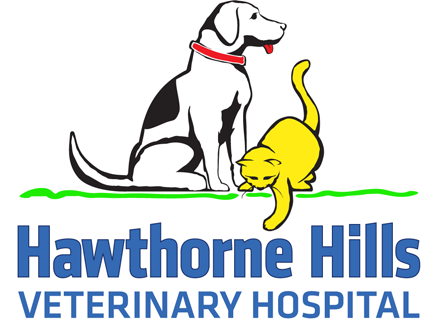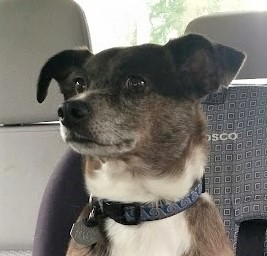
Wally is the sweetest 13 year old terrier mix breed dog. The doctors at Hawthorne Hills Veterinary Hospital have been lucky enough to have him as a patient since 2018. He had been fairly healthy until 2021 when Dr. Nevill diagnosed him with Cushing’s disease.
Managing the Cushing’s disease took some time but he is well controlled on a medication called Vetoryl or trilostane.
In December of 2022 he came to see Dr. Eskesen because his very observant owners noticed a lump in one of his anal glands. Dr. Eskesen was able to get a needle biopsy of the lump right away because Wally is so cooperative. The pathologist report showed that Wally had Anal Sac Apocrine Adenocarcinoma. [As a side note, the anal gland tissue produces the material which is stored in the anal ‘sac’. However, most of us refer to the entire structure as the anal gland, because, in the context or a veterinary visit, the term ‘anal sacs’ can be misheard.]
This type of cancer can spread rapidly and be very invasive locally so Wally was taken to the oncologists at Bridge Animal Referral Center as soon as they had an availability. After some testing to make sure the cancer had not already spread, his anal gland and the tumor were removed.
It is very difficult, if not impossible, to remove every cell of this type of cancer so after the surgery Wally was started on chemotherapy to prevent recurrence.
He has been doing well since then with very few side effects from the chemotherapy and living his best snuggly terrier life.
Anal gland issues are very common in dogs and can also be an problem in cats. The anal glands are next to the rectum and should help secrete a liquidy, smelly substance onto the feces when pets poop. We think this acts as a marking signal to other animals that says “I was here”.
Sometimes anal glands do not get expressed normally and can become impacted or infected. Some animals need regular help expressing their anal glands. This is what Wally’s owners were doing at home when they noticed the lump. The doctors and staff at Hawthorne Hills Veterinary Hospital often express the anal glands during an exam if the owner is complaining that the dog is scooting or licking its rear excessively. Sometimes antibiotics are necessary. If a thickening is found inside the anal gland or symptoms don’t resolve after expression it could be cancer. Dog groomers can express anal glands for maintenance purposes but diagnosis of anal gland problems are best done with a veterinarian.
We are so happy that Wally’s cancer was noticed so quickly and hope he will continue to be a patient with us for many years to come!


